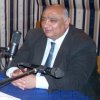A nation's cultural heritage, we are often told, is a pillar and mirror of its identity. It is also a treasure to be shared with others. As we freely enjoy the marvels of civilization created by other peoples, we also contribute the treasures of our own rich cultural history. We are taught to love our own and respect others. At the same time, we have an obligation to preserve our treasures and ensure their rightful place in the world. A living nation's culture is not an ossified relic, but a starting point and inspiration in the continuous process of creating new treasures.
The goal of the BLAGO Fund is to preserve and promote Serbian treasures in a way that ties together the past, present and future. It has two clear objectives. The first is to record, archive and conserve the most vulnerable products of our culture in a systematic and organized way and to disseminate this information to specialists and the general public alike. The second is to encourage and support the development of exceptional Serbian talent.
Serbian history throughout the Middle Ages closely parallels that of the Byzantine Empire which at different times acted as mentor, ally and foe of Balkan Slav nations including the Serbs. Indeed, the Byzantine heritage that permeated this millennial intercourse allowed Serbs to share in, and eventually contribute to the civilization Sir Dimitri Obolensky calls the "Byzantine Commonwealth". Serbian cultural treasures from this era are indeed plentiful. Most often they are reflected in the centers of spiritual life - the medieval Serbian Orthodox churches and monasteries, with their sublime appearance inside and out - and with the values promulgated and treasures preserved within them: principally frescoes, icons, and other objects of fine art, ecclesiastic, biographical and legal manuscripts, and literary works. However, the very nature of these monuments of faith and culture is such that their survival is precarious. It is a sad fact that a significant number of them, having survived the vicissitudes of time and the Ottoman occupation, have disappeared or have been destroyed in this very century due to wars and other calamities. The potential for further damage and loss remains high.
In recent decades, significant, mostly individual efforts have been made in the direction of the conservation and recording of some of these priceless treasures, but there is a dire need to do this in a more systematic and comprehensive way. Modern technology provides recording, archiving and accessing techniques never before available. These modern tools need to be utilized creatively. While the establishment of a computerized database archive does not obviate the need for classical means of conservation and restoration, it opens the road to the preservation and systematic dissemination of information about many crucial elements of our cultural heritage.
In this context, the goals of the BLAGO Fund are:
- to create a well organized archive of our Serbian Orthodox Church treasures along with other Serbian cultural treasures;
- to connect those individuals and institutions at home and around the world that are actively involved in collecting, categorizing, and documenting this historic inventory;
- to make this information readily and freely accessible to interested individuals and centers of learning.
The BLAGO Fund's mandate is to preserve and publicize our rich heritage, while maintaining a forward-looking view. This will be achieved by a special program to support our rich talent in the homeland.
One of our challenges is to ensure that budding, young, Serbian talent is allowed to bloom fully and make its proper contribution at both the national and international levels it merits. Regrettably, the present situation that persists in our homeland has taken its toll in this arena as well. Gifted individuals can progress while taking advantage of the existing educational system. Typically, however, these students are stymied at graduation. Often left to choose between working for various foreign sponsors with their own special interests and agendas or playing the mundane game of survival, these talents seldom develop as they should.
The BLAGO Fund intends to address this need by identifying key centers of artistic excellence and establishing separate sub-funds for each. These would enable the creation of a regular competition designed to stimulate and maintain the best talent at the key juncture described above. Through highly visible award ceremonies, this program would send an important message that cultural achievements matter and that they are recognized and appreciated. This effort aims to provide the crucial link in the infrastructure that is already largely in place in the old country with an environment that supports and nurtures talent.
In summary, the BLAGO Fund has set for itself an ambitious and important task in preserving and promoting both our cultural heritage and its development. The goal is twofold: one, to enable the Serbian people to better understand and appreciate their own cultural context and proper place in the world; two, to open and expand our national cultural treasures, past and present, in a way that allows the world to fully share in all their value and beauty.
San Francisco, March 1998



